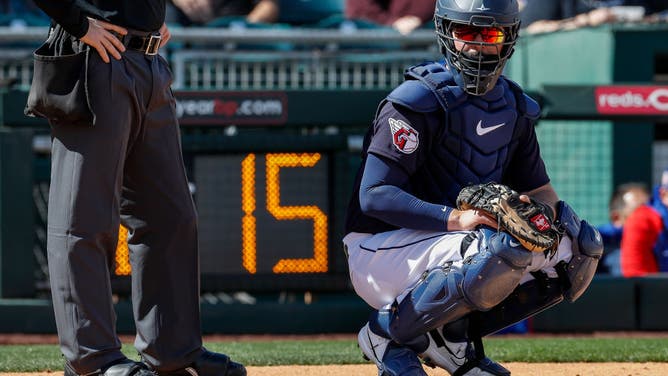We Now Have Data on Just How Big of a Difference the Pitch Clock Makes
The new pitch clock instituted by Major League Baseball has been a controversial change, to say the least.
Baseball purists hate it, wanting the game to remain in its historical format
MLB, meanwhile is adamant that shortening game times and increasing pace of play will draw younger fans back to the sport.
Players seem to be mixed, with some enjoying the increased pace and others uncertain about its impact on their routines.
Certain pitchers have already taken advantage of the changes; Max Scherzer used it to quick pitch a hitter recently getting a strikeout.
One Yankees pitcher did something similar and completed an entire at bat in 20 seconds.
READ: YANKEES PITCHER TAKES ADVANTAGE OF PITCH CLOCK, GETS 20-SECOND STRIKEOUT
But what has it meant in the broader picture across the sport?
Well, we now have some data, and it's been a dramatic difference, to say the least.

GOODYEAR, AZ - FEBRUARY 26: The pitching clock winds down as Cleveland Guardians catcher Cam Gallagher (35) gets set for the pitch during a spring training game between the Cleveland Guardians and Texas Rangers on February 26, 2023, at Goodyear Ballpark in Goodyear, AZ. (Photo by Brandon Sloter/Icon Sportswire via Getty Images)
Pitch Clock Cutting Times
MLB writer Jeff Passan tweeted about the differences in game time and action plays from spring training 2022 to 2023.
And it's massive.
Games on average have been 25 minutes faster than they were in 2022.
Considering the average game length was 183 minutes in 2022, that's a 14% decrease. Due in large part to the pitch clock, and strict enforcement.
Strikeout rates have dropped, there's been more stolen base attempts, and a slight increase in runs per game.
Interestingly, the World Baseball Classic is not using the new rules, making for a fascinating comparison with spring training games played under MLB's adjusted format.
In perhaps the starkest example of the pitch clock's impact, one game placed under WBC rules with a similar amount of batters, runs, hits and errors took literally an hour longer than one with the rules.
Many baseball fans don't mind games taking three hours to complete. But all too often, three hour games have been 2-1 score lines with 10-12 combined hits between the two teams.
Pitching changes, endless throws to first base, hitters and pitchers taking their time to get set for play; all of it's contributed to unnecessarily long games.
To this point, the pitch clock seems to be paying dividends in terms of length and in-game excitement.
We'll see soon how that works in the regular season with higher stakes. But as of now, MLB's must be pleased with what they're seeing.